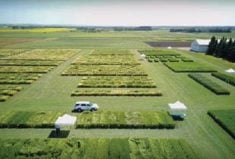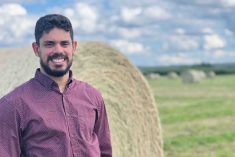When faced with a problem at work, most people head straight to their boss’s office for advice. But what happens when you are the boss?
That was Bryanna Kumpula’s challenge when she became executive director at the Agriculture and Food Council of Alberta four years ago. And when that happened, she turned to her mentor for support.
“When you’re leading an organization, there are a lot of things you can’t talk to your staff about, and you can’t necessarily talk to the board about them because they’re not involved in the day to day,” said Kumpula, who also co-owns two agri-food businesses.
Read Also

Farming Smarter receives financial boost from Alberta government for potato research
Farming Smarter near Lethbridge got a boost to its research equipment, thanks to the Alberta government’s increase in funding for research associations.
“Having someone at a senior level who can provide you with advice and guidance, and even just to bounce ideas off of, has been really useful for me.”
Kumpula is one of a growing number of women in the agriculture and agri-food sector who are benefiting from formal and informal mentorships, said Heather Broughton, “community animator” for the Success for Women in Agri-Food program.
“Mentors have the ability to share their knowledge but through their questions, they also make you think through the situation. They’re not there to solve the problem for you — they’re there to be a sounding board,” said Broughton.
“The mentor I had made me look at things in different ways so when I did come to a decision, it was an informed and balanced decision.”
For many entrepreneurs, having a trusted adviser can mean the difference between success and failure.
“They use their expertise and knowledge to give you some guidance,” said Broughton. “But they also give you encouragement and build your confidence to make the decisions that you need to.”
In the past, Kumpula has had both formal and informal mentors who have helped her navigate her leadership roles, but currently board chair Barry Mehr is mentoring her.
“I’m very fortunate that he’s sitting in the chair role and has provided guidance, questions, and mentorship with regard to me building my skills as a person and building this organization,” said Kumpula.
“Everything gets done through relationships, and he has a huge amount of knowledge and connections within the industry.”
Lasting legacy
That was one of the main reasons Lyndsay Smith joined the Cattlemen’s Young Leaders’ mentorship program five years ago.
“At that point in my career and in my life, I was looking for an opportunity to expand my knowledge and my connections, and the Young Leaders’ program was a natural fit for that,” said Smith, who owns a consulting company called Prime Analytics in Taber.
At the time, Smith was considering a career in politics, and her mentor — longtime Manitoba farm leader Owen McAuley — gave her the guidance she needed.
“It was a great experience. He really felt that the mentorship was about making connections in the industry, so I had the opportunity to meet with Ralph Goodale and Preston Manning,” she said. “It was great being mentored by someone in the industry who has lots of experience and who can help you make those connections.”
Smith also appreciated having an unbiased person to bounce ideas off of.
“Owen was really good at challenging me and getting me to think outside of the box. I really appreciated that,” she said. “Even though it’s five years later, I know that I could call my mentor up and have a conversation with him.”
This year, Smith and her husband have teamed up through the program to mentor a young farmer from Manitoba in risk management.
“We’re young in the industry as well, and I still remember first starting and how overwhelming it could be,” said Smith. “So far, it’s been a fantastic opportunity to connect with yet another person in ag and share our passion for risk management with someone who is very willing to learn.”
In many cases, people don’t realize they have the skills and experience needed to be mentors, said Broughton.
“Lots of women have lots of experience and knowledge to share with those who are just starting out,” she said.
Broughton is currently searching for 10 to 12 potential business mentors for the Success for Women in Agri-Food program in five locations across the province — Lethbridge, Olds, Parkland County, Vermilion, and Fairview.
“One of the components that came out of the research piece of this program was that women in agriculture and agri-food as entrepreneurs were really looking for some mentorship,” said Broughton.
“Being in rural Alberta, there’s not always resources out there, and they really are looking for some reference people that they could use as mentors as they go through this entrepreneurial process.”
Potential mentors and mentees will be invited to a ‘speed-dating’ style event, where they will have a chance to have short one-on-one conversations before picking who they want to be matched with.
“I can’t just match somebody up with somebody else who I think is going to be a good fit. We really want this to be a natural fit,” said Broughton.
She is also planning on facilitating some virtual mentorships for “situation-specific” needs, including areas such as human resources and marketing. (Men and women are both welcome to apply to be mentors. The program runs from March until October.)
“We’re hoping they would have an hour twice a month to have a conversation with the mentee,” said Broughton.
Both she and Smith say mentoring is a great way to give back to the community.
“You have to remember what it was like starting out in the industry or times that you had challenges when it would be nice to bounce ideas off of other people,” Smith said. “When you become a mentor, you have a chance to share your passion and your skills and hopefully help the next person along.”
For more information, contact Broughton at 780-608-7374 or [email protected].















